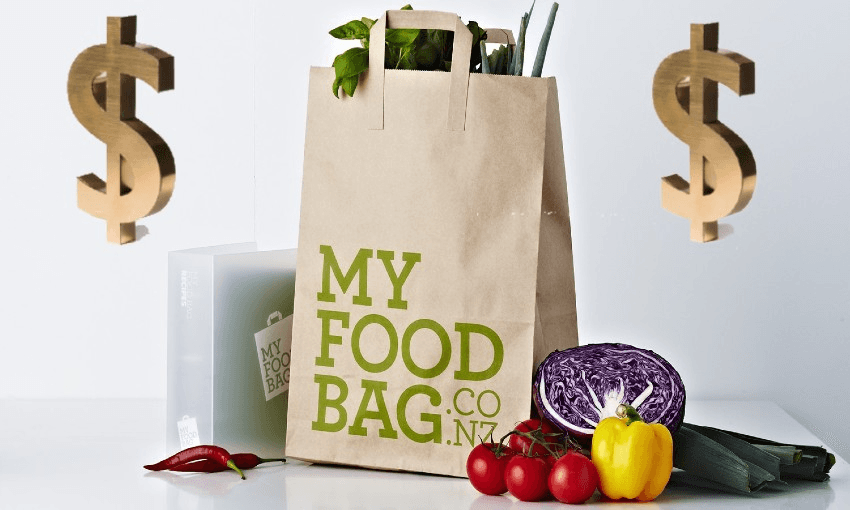My Food Bag has been the poster child of the ever-popular meal-kit game since it first began trading in 2013. Now that it’s heading to the stock market, investors are lining up to get in on the action.
What’s all this then?
New Zealand’s longest-running meal kit delivery company, My Food Bag, has been in the spotlight this month as it embarks on an NZX listing that will see its shares offered to New Zealand investors for the first time.
With its high profile, recognisable brand and celebrity founders, the listing has been billed as one of the most compelling in recent years, and it’s already attracted strong support from fund managers and brokers – Forsyth Barr, Craigs Investment Partners and Jarden are all involved in the initial public offering (IPO). It’s also due to be listed on the Australian Stock Exchange (ASX).
Such an opportunity is bound to appeal to retail investors as well, who will be eager to snatch a slice of a homegrown company that has delivered over 85 million meals since it began trading in 2013, and is now reportedly known to 88% of New Zealanders.
Hold on, what exactly is My Food Bag?
MFB is a company that specialises in delivering kits containing ingredients and recipes that people can use to create meals. It was founded in 2012 by entrepreneurs James and Cecelia Robinson, celebrity chef Nadia Lim and her partner Carlos Bagrie, and former CEO of Telecom Theresa Gattung.
With few competitors in a nascent industry, the company quickly became a household name, and in 2016 it restructured, with a $35.8 million capital injection from Waterman Private Capital, giving the private equity firm a 70% stake.
The original shareholders received $61.1m for the sale, and the board was restructured to include the Waterman representatives and the original founders, minus Lim and Bagrie who stepped down from governance roles.
The original shareholders will be selling the bulk of their holdings in the IPO, which will earn them another $75m, while retaining $32m at the $1.85 IPO price. Waterman will be selling 104.8 million shares for $194m through the IPO, while retaining 36.4m shares – 15% of the company.
So what’s the value of My Food Bag?
With the IPO price set at $1.85 a share and 242 million shares being issued, the company has been valued at $448.5m, compared to forecasted earnings of $34.2m for 2022, and average earnings of $18m over the past four years.
Despite the immense interest in the IPO, some brokers and commentators have observed that it is relatively expensive, especially considering the company appears to have matured and sufficiently permeated the meal-kit market. The product disclosure statement forecasts a slight decline in revenue for 2022, but an increase in before tax earnings of $5.7m, as well as a 5% gross dividend yield.
The company did very well through the Covid-19 level four lockdown in March 2020, as more housebound consumers took to online purchasing and food delivery – earnings are forecasted to jump from $16.3m in 2020 to $28.5m at March 31 2021.
While the move to e-commerce is certainly not a fleeting one, some commentators have also noted the lack of MFB’s potential for international expansion. The New Zealand arrival of high-flying German multinational rival Hello Fresh in 2018 means My Food Bag can no longer enjoy a first-mover advantage.
MFB CEO Kevin Bowler told BusinessDesk the company was likely to outperform the growth targets outlined in its public offering documents, justifying its high valuation. However, these comments were promptly corrected in a statement by the company’s chair, Tony Carter, as they went against the Financial Market Authorities requirements.
How does the IPO work?
Investors will be able to purchase MFB shares at $1.85 per share through the IPO.
While the NZX and ASX listing has been tentatively set for March 5, the IPO will progress through a series of stages, starting on February 19 with a bookbuild, foodies offer, priority offer and broker firm offer. The priority offer is available only to Waterman investors, while the broker offer applies to New Zealand clients of brokers who have received an allocation. Retail investment platform Sharesies has told The Spinoff it will be offering its clients shares through the IPO, and will send out notifications on Friday.
Anything else?
MFB’s public offering documents mention numerous growth opportunities for the company as it capitalises on its brand and moves into the wider food and grocery market. However, in a column for BusinessDesk, Brain Gaynor wondered why the existing shareholders would be selling 75% of their holdings if the company is forecasting significant growth.
“Why are CEO Kevin Bowler and CFO Mark Winter, who are relatively new to the company, selling 4.1 million of their combined 5.4 million shares through the IPO?” Gaynor asked.
He also noted that four out of five directors have been part of the company for only a month, with “Chris Marshall the only remaining director with a deep knowledge of the company”.
However, Henry Chung, director of investment banking at Jarden, said at the time of the announcement the IPO will offer investors the opportunity to get involved in a sector they had so far been unable to access on the NZX.
“Companies like My Food Bag taking the lead in going public on the NZX can really make an impact, encouraging new companies to list and allowing investors to expand into new industries – locally.”
This story is not intended as investment advice.
